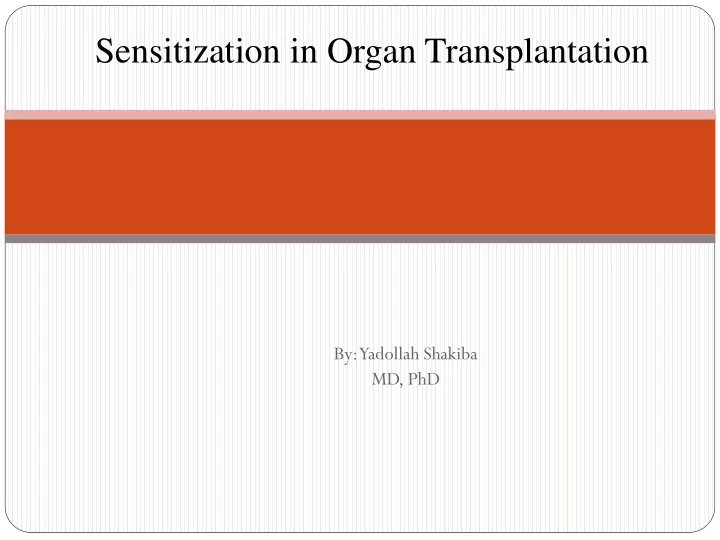

Sensitization in Organ Transplantation By: Yadollah Shakiba MD, PhD
Ba Barrie iers s to suc o succe cessf ssful ul tr tran ansp splant ant Immunogenic and polymorphic Blood groups-ABO Anti-HLA Antibody None-HLA Antibody 2
ABO in Organ Transplant ABO selection in highly sensitized patient? 3
Revolutioni olutionizing zing article ticle
Main Antigens in Allograft Rejection? Immune response to polymorphic molecules Numbers of HLA Alleles HLA Class I 11,100, 20,182 Alleles HLA Class II 3,920, 7,407 Alleles HLA Alleles 15,020, 27,589 5
The reasons of Anti-HLA antibody production HLA Incompatibility Large amount of antigens Allograft Long term exposure with immune system Pregnancy Respond to spouse HLA antigens Transfusion Low amount of leucocytes in blood bags Natural Anti-HLA Ab Male without transfusion 6
Understanding the CRE REG Sensitization in Pregnancy or allograft makes many patients incompatible 7
Understanding the CRE REG 8
Sensitization after first kidney transplant in IRAN About 500 patients waiting for second transplant included Previous transplant was cadaver and living donor 86% of patients were sensitized. 52% were positive for both anti-HLA class I and class II antibodies 3% sera were positive for only anti-HLA class I antibody 31% Sera were only positive for anti-HLA class II antibody 14% sera were negative for both anti-HLA class I and class II antibodies 40-50% of women with history of pregnancy are sensitized 9
Det Detection ection of se sensi sitizing tizing antig tigen en Sex/age: F/28 Previous transplant: Negative Blood transfusion: Negative Number of pregnancy: 2 10
Flow cross match with husband cells 11
Anti HLA antibodies detected A*23:01- A*24:02- A*25:01- A*32:01 B*13:01- B*27:05- B*38:01- B*44:02 B*49:01- B*51:01- B*52:01- B*57:01 Name Rel. Class I PCR Class II PCR Patient Recipient A*02 DQB1*03- DQB1*06 B*18 DRB1*03- DRB1*11 C*07- C*12 DRB3 Name Rel. Class I PCR Class II PCR Husband A*02-A*30 DQB1*05- DQB1*06 B*18-B*49 DRB1*13-DRB1*15 C*07 DRB3- DRB5 12
CREG Antigens included A1C A1, 3, 11, 19 (29, 30, 31), 36, 80 A2 A2, 9 (23, 24), 28 (68, 69), B17 (57, 58) A10C A10 (25, 26, 34, 66), 32, 33, 43, 74 BW4 A9 (23, 24), 25, 32, B13, 27, 37, 38, 44, 47, 49, 51, 52, 53, 57, 58, 59, 63, 77 B5C B5 (51, 52.) 18, 35, 53 B5C2 B5 (51, 52), 15 (62, 63, 71, 72, 75, 76, 77), 17 (57, 58), 21 (49, 50), 35, 53, 73,78 BW6 B7, 8, 14, 18, 35, 39, 40 (60, 61), 41, 42, 45, 46, 48, 50, 54, 55, 56, 62, 64, 65, 67, 71, 72, 73, 75, 76 B7C B7, 8, 13, 27, 41, 42, 47, 48, 54, 55, 56, 60, 61, 81 B8C B8, 18, 38, 39, 64, 65 B12C B12 (44, 45), 13, 37, 41, 47, 21 (49, 50), 40 60, 61) 13
14
The role of IgM DSA 15
This preliminary study implies that pre-formed IgM antibodies may not be harmless autoantibodies and that the presence of IgM DSA should be sought in patients with IgG HLA- or DSA-negative AMR 16
Our experience with IgM DSA
Anti HLA class I Reactive Antigens IgG Anti HLA class I Reactive Antigens IgM High Risk Antigens A*23:01- A*24:02- A*25:01- A*26:01- A*34:01- High Risk Antigens None (MFI >1000) A*68:01- B*07:02- B*08:01- B*13:01- B*14:02- (MFI >1000) B*15:01- B*18:01- B*27:05- B*38:01- B:40:01- Moderate Risk Antigens None B*44:02- B*45:01- B*49:01- B*51:01- B*52:01- (MFI 500-1000) B*57:01 Moderate Risk Antigens A*02:01- A*11:01- A*32:01 (MFI 500-1000) Anti HLA class II Reactive Antigens IgG Reactive Antigens High Risk Antigens None (MFI >1000) High Risk Antigens DRB1*01:03- DRB1*04:05 Moderate Risk Antigens None (MFI >1000) (MFI 500-1000) Moderate Risk Antigens DRB1*10:01- DRB1*16:01- DRB1*04:04- (MFI 500-1000) DQB1*04:02- DQB1*03:01- DQB1*03:02
Complement activation potency: IgM+++ IgG3++ IgG1+
Underestimation of anti-HLA antibodies 23
Annette M Jackson presentation 24
Role of none HLA antibodies in Rejection 1- HLA matched kidney finally fails 2- 15-20% of failed transplants=no DSA 3- hyper acute or acute rejection despite DSA 25 Annette M Jackson presentation
26 Annette M Jackson presentation
Production of non-HLA antibodies 27
Non-HLA antibodies may be present before transplant 28 Annette M Jackson presentation
29
Diffuse HLA-DR positivity in proximal tubules in active antibody 30 mediated rejection (immunohistochemistry, HLA-DR, 100×).
Indication for non-HLA Ab screening Second transplant patients Patients with history of hyper acute rejection Patients with high cPRA Patients with previous history of hypertension 31
Major r histocom compatib patibility ility-com comple plex x (M (MHC) ) cl class s I – re rela lated ed ch chain n A (M (MICA) A) Patients with anti-MICA antibodies had a 1-year graft-survival rate of 88.3±2.2% as compared with 93.0±0.6% among patients in the MICA antibody – negative group (P=0.01). N Engl J Med 2007; 357:1293-1300 32
33
34
35
Anti ti En Endoth thelial elial antib tibody ody 36
37
38
39
40
Recommend
More recommend